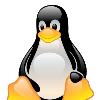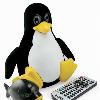

Topics: Technology Tags: Linux View |
Topics: Technology Tags: Linux View |
Topics: Technology Tags: Linux, Textual Analytics View |
|||||||||
Tags: Linux View |
Tags: Linux View |
Tags: Linux View |
|||||||||
Tags: Linux View |
Linux (commonly pron-en?l?n?ks respellLIN?ks in American English, also pron-en?l?n?ks respellLINooks in Europe and Canada) refers to the family of Unix-like computer operating systems that use the Linux kernel. Their development is one of the most prominent examples of free and open source software collaboration; typically all the underlying source code can be used, freely modified, and redistributed, both commercially and non-commercially, by anyone under licenses such as the GNU General Public License.
Linux can be installed on a wide variety of computer hardware, ranging from mobile phones, tablet computers and video game consoles, to mainframes (mainframe computer) and supercomputers. Linux is predominantly known for its use in servers (server (computing)); as of2009alt=as of 2009 it has a server market share (Usage share of operating systems#Servers) ranging between 20-40%. Most desktop computers run either Microsoft Windows or Mac OS X, with Linux having only 1-2% of the desktop market. However, desktop use of Linux has become increasingly popular in recent years, partly owing to the popular Ubuntu (Ubuntu (operating system)), Fedora (Fedora (operating system)), Mint (Linux Mint), and openSUSE distributions and the emergence of netbooks and smart phones running an embedded Linux.
Typically Linux is packaged in a format known as a Linux distribution for desktop and server use. Linux distributions include the Linux kernel and all of the supporting software required to run a complete system, such as utilities (system utility) and libraries (library (computer science)), the X Window System, the GNOME and KDE desktop environments, and the Apache HTTP Server. Commonly used applications with desktop Linux systems include the Mozilla Firefox web-browser, the OpenOffice.org office application suite and the GIMP image editor.
The name "Linux" comes from the Linux kernel, originally written in 1991 by Linus Torvalds. The main supporting Userland (Userland (computing)) in the form of system tools and libraries from the GNU Project (announced in 1983 by Richard Stallman) is the basis for the Free Software Foundations preferred name GNU/Linux (GNU/Linux naming controversy).cite weburl=title=The GNU Operating System publisher=Gnu.org accessdate=2009-04-17
Logo: File:Tux.svg
Family: Unix-like
Website: www.kernel.org/
Developer: Linus Torvalds and thousands of collaborators
Marketing Target: Desktops, servers, embedded devices
Kernel Type: Monolithic (Monolithic kernel)
Ui: nowrapGraphical (Graphical User Interface) (X Window System)
Programmed In: C (C (programming language))
Prog Language: C (C (programming language)), C++
Userland: GNU (GNU Core Utilities) and others
Supported Platforms: IA-32, MIPS (MIPS architecture), x86-64, SPARC, DEC Alpha, Itanium, PowerPC, ARM (ARM architecture), m68k, PA-RISC, s390, SuperH, M32R and more
License: Various including GNU General Public License, BSD License, Apache License, MIT License, and others
Language: Multi-lingual
Working State: Current Listen
Filename: Linus_pronounces_linux_(english).oga
Title: How Linus Torvalds pronounces Linux
Format: Ogg







